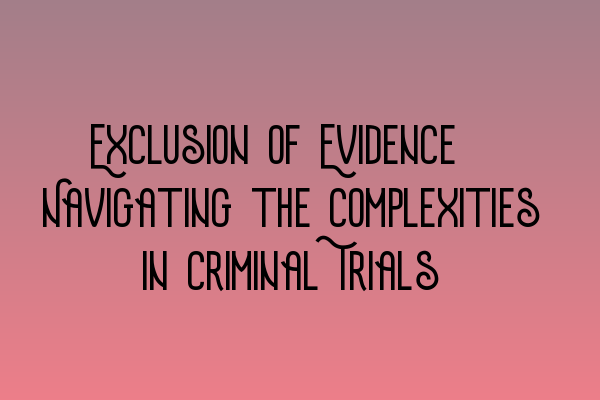Exclusion of Evidence: Navigating the Complexities in Criminal Trials
Welcome to the SQE Criminal Law & Practice Law UK blog! In this article, we will be delving into the complexities surrounding the exclusion of evidence in criminal trials. This is a critical aspect of the legal process that requires a deep understanding of the rules and procedures governing admissibility. Navigating this terrain successfully can make all the difference between a favorable outcome for your client and a devastating loss.
Before we dive into the intricacies of excluding evidence, let’s briefly address the importance of preparation. As aspiring solicitors, it is crucial to equip ourselves with the necessary study materials to excel in the SQE exams. To ensure your success, we recommend checking out our article on SQE Exam Prep: Essential Study Materials for Aspiring Solicitors.
The Role of Evidence in Criminal Trials
Understanding the role of evidence is fundamental to comprehending the significance of excluding certain types of evidence from trial. Evidence serves as the foundation upon which cases are built and decisions are made. It is the crucial link between allegations and the truth.
When evidence is admitted in court, it is considered to be credible and relevant to the case at hand. However, not all evidence is admissible. There are certain circumstances, rules, and guidelines that determine whether evidence should be excluded, even if it appears relevant or beneficial to one party.
Grounds for Exclusion of Evidence
Exclusion of evidence can occur under various grounds, each with its own specific requirements. As solicitors, it is essential to have a grasp of these grounds to effectively argue for the exclusion of evidence in your client’s best interest.
1. Illegally Obtained Evidence
When evidence is obtained in violation of the law or constitutional rights, it is considered illegally obtained evidence. This includes evidence obtained through unlawful searches, seizures, or confessions. It is imperative to understand the intricacies of the rules surrounding illegally obtained evidence to challenge its admissibility in court.
2. Unreliable or Hearsay Evidence
Hearsay evidence refers to statements made by someone other than the person testifying. It is generally considered to be unreliable as it is not subject to cross-examination or scrutiny. Understanding the nuances of hearsay evidence and the exceptions to its exclusion is crucial in building a strong case. To learn more about building strong cases, check out our article on Expert Testimonies in UK Courts: Building Strong Cases.
3. Privileged Communication
Privileged communication refers to confidential information exchanged between certain individuals, such as lawyers and clients, doctors and patients, or spouses. Understanding the concept of privileged communication is essential in protecting your client’s rights and preventing the improper use of privileged information as evidence.
4. Prejudicial or Unfair Evidence
Even if evidence is legally obtained and considered reliable, it may still be excluded if its probative value is substantially outweighed by the risk of unfair prejudice or confusion. It is vital to navigate the delicate balance between presenting strong evidence and avoiding prejudicial or unfair tactics that may jeopardize the outcome of the case.
Challenges in Excluding Evidence
Successfully excluding evidence in criminal trials can be a daunting task. The complexities lie not only in understanding the various grounds for exclusion but also in presenting persuasive arguments to convince the court to exclude the evidence. It requires meticulous planning, thorough research, and exceptional advocacy skills.
To help you demystify the Solicitors Qualifying Examination format and enhance your success strategies, we encourage you to read our article on Demystifying the Solicitors Qualifying Examination Format.
Conclusion
In conclusion, exclusion of evidence is a complex and nuanced aspect of criminal trials. As aspiring solicitors, understanding the intricacies of admissibility and exclusion is crucial in building strong cases and protecting the rights of your clients. The road to success in the SQE exams and the legal profession is paved with continuous learning and preparation. For more step-by-step guides and information on starting your own LLC, don’t forget to check out our article on LLC Formation Made Simple: Step-by-Step Guide for UK Entrepreneurs.
We hope this article has shed some light on the complexities surrounding the exclusion of evidence in criminal trials. Stay tuned to the SQE Criminal Law & Practice Law UK blog for more informative and engaging content!
